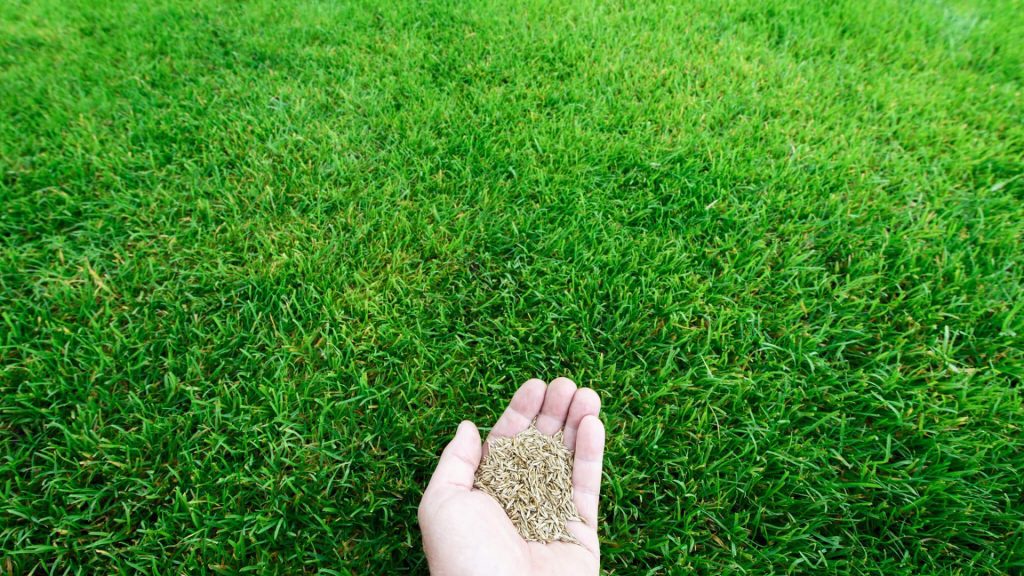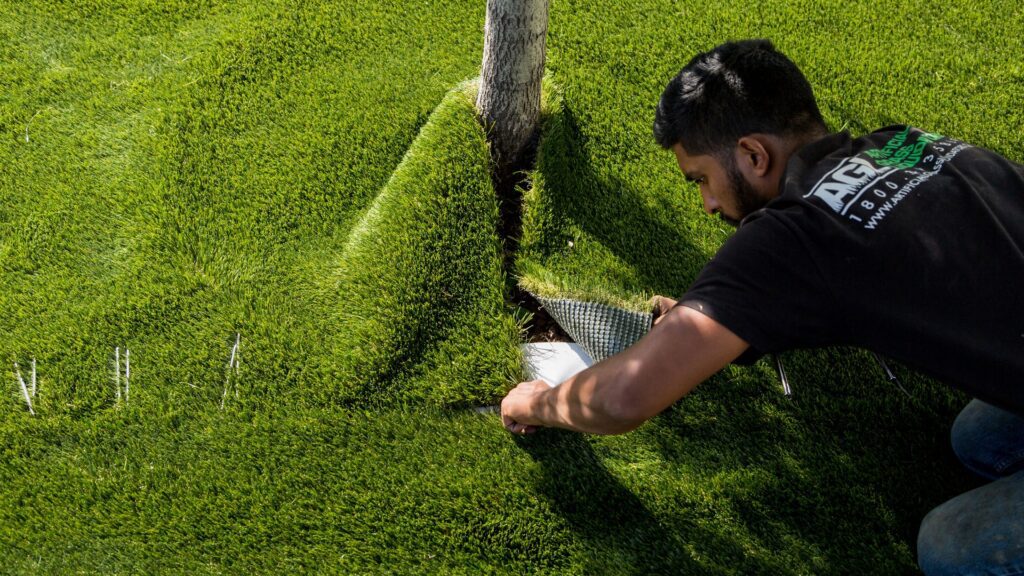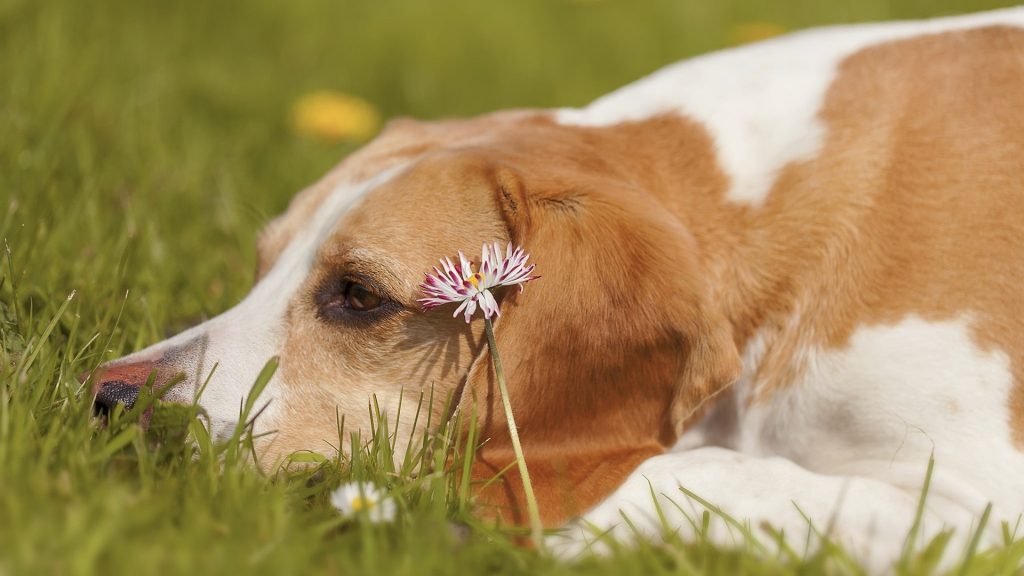
What Is The Best Grass For Your Dog?
If you have dogs, you might notice that your lawn is not looking as good as it used to. You might also find that your dog’s experiencing negative symptoms from spending time on the grass, such as ticks or allergies.
Can dogs damage your lawn? Dogs urinate, poop, and run around in your grass, all of which can weaken the grass blades. So having a dog does require a different kind of lawn maintenance procedure.
In this guide, we feature what you need to know about ensuring your lawn is safe for your dog and we include some tips to dog-proof your pretty lawn. Let’s start out by looking at why Fido loves to chew on grass blades.
Why Do Dogs Love Grass?
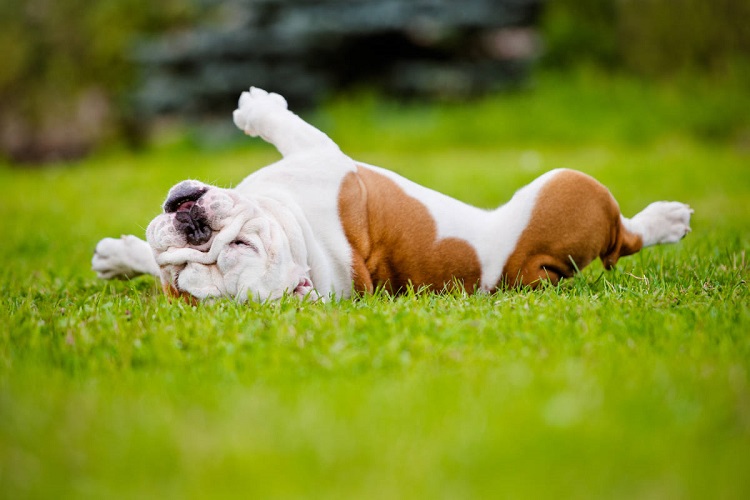
Have you ever noticed Fido rolling around in the grass? Dogs do this for various reasons, such as because they can pick up a smell in the grass or they want to leave behind their scent.
Dogs also like to eat grass. This forms roughage in their diet and gives them some much-needed fiber. Without enough fiber, dogs can experience digestion issues or they might battle to pass stool.
Both of these dog behaviors are why you should ensure that your grass is safe for Fido to chew and play on! It should be free of chemical herbicides, fertilizers, and pesticides.
If you’ve applied a chemical to your lawn, always read the product instructions so that you know for how long you should prevent your dog from walking on the lawn in order to prevent him or her from getting exposed to harmful chemicals.
What Grass Is Best For Dogs?
There are many different grass types. Some are better for your dog than others. Here’s a rundown of the best types of grasses for your dog.
Fescue
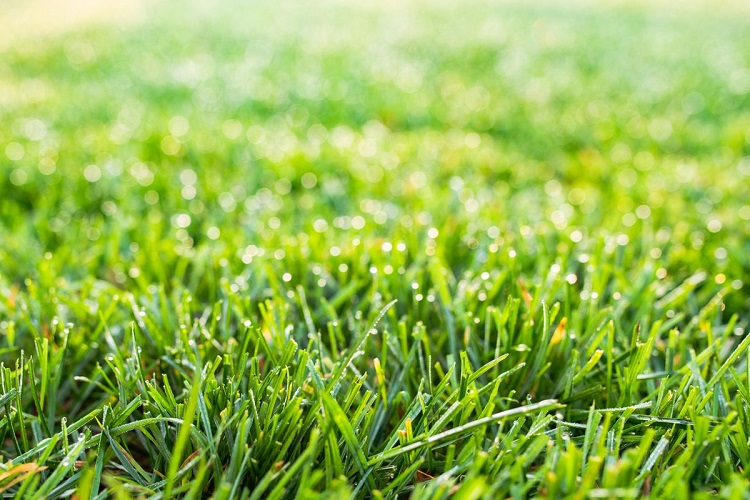
Since fescue grass is tough and durable, it can handle energetic dogs that love to roll around and run across the lawn. Since your dog might also love to urinate on your lawn, fescue grass is highly absorbent so it will be able to deal with it.
Kentucky Bluegrass
This is another dog-friendly grass, especially for dogs that love to run around the lawn. It’s a durable type of grass that grows quickly and is also fast healing, so it will handle your dog jumping and running on it every day without becoming damaged.
Bermuda
Bermuda is a fast-healing and durable grass, but what especially makes it ideal for you if you own dogs is that it has a deep root system. This makes it sturdy, so it can handle stress in the form of dog paws.
Zoysia
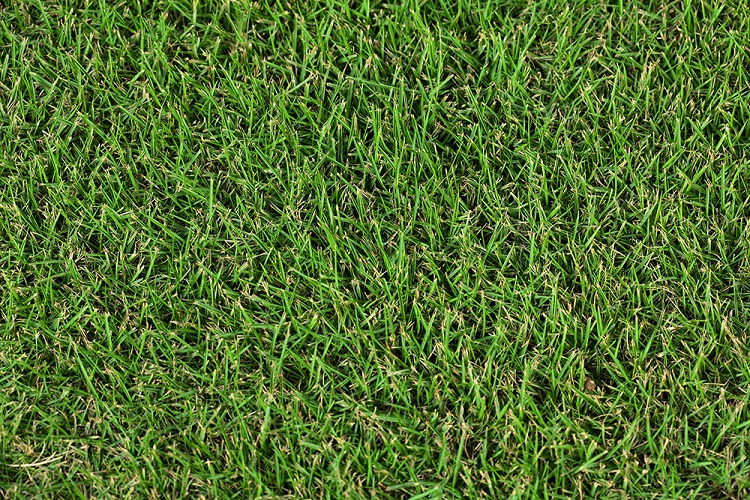
This is a tough type of grass that can withstand high temperatures and a lot of foot traffic without becoming damaged.
So, it’s not only great for your dog but for you too! It’s also dense, which makes it durable, and it doesn’t require a lot of maintenance to look good.
Perennial Ryegrass
This type of grass thrives in cool climates, and it’s great for your dog because it has a strong root system and tends to grow fast. This makes it much stronger against damage.
Climate-Suitable Grass
A general tip you need to follow when planting dog-friendly grass is to choose a grass species that is appropriate for the climate in your region.
If you don’t, the grass won’t grow in a healthy way, which will cause it to be stressed and vulnerable to damage as well as disease.
Can Tall Grass Irritate Your Dog’s Skin?
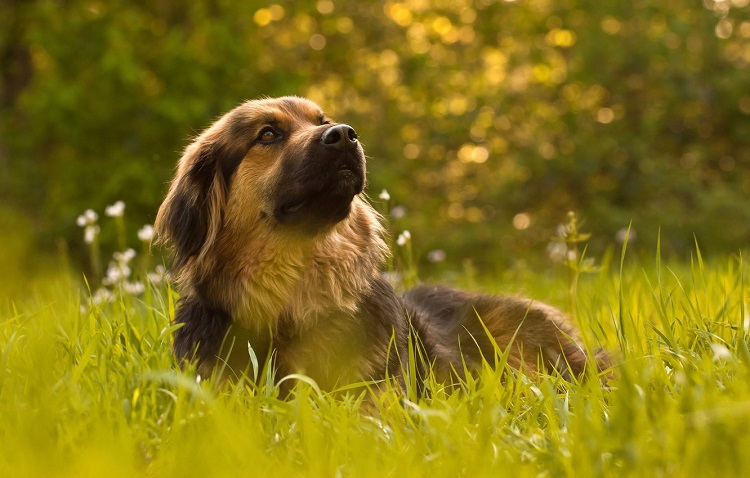
If your dog loves spending a lot of time on the grass outside, and you’ve noticed that he or she is experiencing itchy red skin or paws, they’re sneezing, and they have a runny nose or eyes, these are symptoms linked to grass allergies.
You should consult with a veterinarian to determine if this is the case so it can be treated. However, you should also prevent your grass from getting too tall. Mow it regularly so that its heads won’t irritate your dog’s skin.
Note that it’s not just tall grass that can irritate the skin of a dog who’s got allergies. You should also keep an eye on the weather to get pollen indicators in your area because your dog might be allergic to pollen.
To help your dog who’s experiencing an allergy from pollen or grass, wipe down their paws and legs with warm water after they’ve played outside. This can help to reduce their allergy symptoms.
How To Prevent Ticks In Your Grass
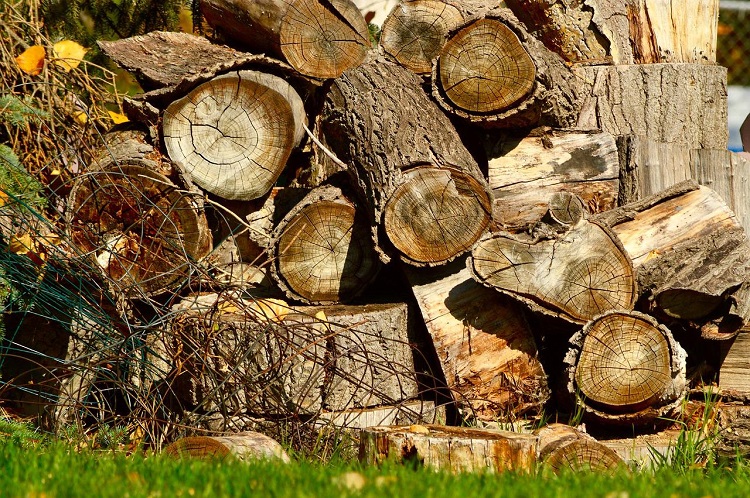
You want to keep ticks away from your dog. They can cause deadly tick paralysis and transmit potentially fatal diseases to your pet. However, this depends on the tick species. Some tick bites cause just a bit of irritation to your dog.
But you should be safe and ensure your yard is free of ticks to keep your dog healthy and free of bites. Here are some important tips to eliminate ticks from your lawn.
- Mow your lawn regularly: Eliminate tall grass so that ticks can’t hide in it. You should also remove tall brush, leaf litter, and grass clippings.
- Add wood chips or gravel to your landscaping: These materials help to block the path that ticks take across your lawn, so they’re a good way to deter them. A pro tip is to put a woodchip or gravel zone between your lawn and any other areas of the garden.
- Stack your woodpiles: If you have woodpiles on your property, these should be stacked neatly in dry areas. If the wood becomes wet, it can attract ticks.
- Choose plants that naturally repel ticks: Some plants, such as American beautyberry bushes, not only look attractive in your garden but they naturally keep ticks away from your lawn. Other tick-repellent plants include eucalyptus, chrysanthemums, rosemary, and mint.
Is Natural Grass Better For Dogs Than Artificial Grass?
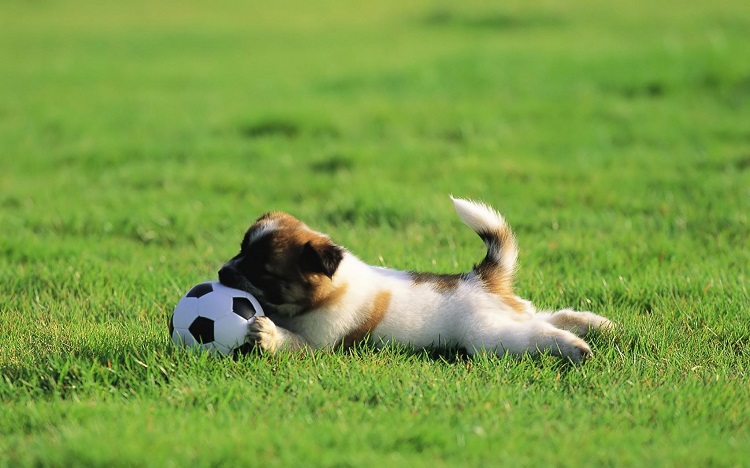
You might wonder if artificial grass or natural grass is better for your dog. While artificial grass always looks good and doesn’t require much maintenance, natural grass is definitely better for dogs.
For starters, they can eat it, which gives them some fiber in their diets. It also works well to soak up dog urine. Microbes that are present in the soil break down organic substances such as urine and transform them into beneficial fertilizers.
However, with natural grass, you have to ensure that you find ways to prevent your dogs from urinating in the same spot of your lawn all the time.
This is because pet urine contains high levels of nitrogen that can cause yellowish-brown patches in the grass. You should encourage your dogs to drink more water which will reduce the urine’s nitrogen content.
When it comes to excretions, the good news is that dog poop doesn’t contain a lot of nitrogen but the bad news is that it can still damage your lawn over time as a result of its moisture and bacteria content.
These can also encourage the growth of lawn fungi. It’s, therefore, a good idea to remove your dog’s poop immediately to reduce its effects. You can also hose the area with water to dilute any nitrogen left behind.
Related Questions
How can you tell if your dog has a tick?
Run your fingers through your dog’s fur. If your dog has a tick, you’ll feel a small, hard mass. Do routine checks for ticks on your dog’s torso, between their toes, on the inside of their ears, around their legs, and around their face and neck.
Could your dog’s grass-eating habit be a bad thing?
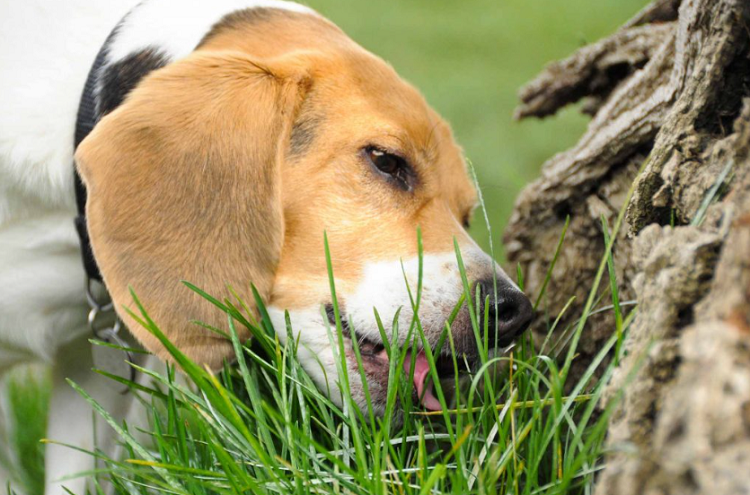
If your dog is eating grass regularly, this could be because he or she is anxious. Since dogs require human interaction, if your dog spends a lot of time on their own this can cause them to turn to attention-seeking behavior such as eating grass.
Should you prevent your dog from playing on a wet lawn?
If your dog is energetic and runs around on the grass, you should avoid him or her playing on your lawn when it’s wet. This is because it can cause more damage to the grass.
Conclusion
If you have a dog, you will want to ensure that your lawn is dog-friendly. We’ve featured some important tips to keep your lawn safe for Fido, as well as some advice you should know, such as if the artificial grass is better than natural grass.
Now that you know the best grass for dogs to enjoy, Fido can have fun and you can have a beautiful lawn!
Resources:
